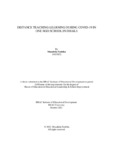| dc.contributor.advisor | Islam, Md Tariqul | |
| dc.contributor.author | Tasbiha, Muzahida | |
| dc.date.accessioned | 2021-12-02T04:46:55Z | |
| dc.date.available | 2021-12-02T04:46:55Z | |
| dc.date.copyright | 2021 | |
| dc.date.issued | 2021-10 | |
| dc.identifier.other | ID 19357072 | |
| dc.identifier.uri | http://hdl.handle.net/10361/15686 | |
| dc.description | This thesis is submitted in partial fulfilment of the requirements for the degree of Masters of Science in Early Child Development, 2021. | en_US |
| dc.description | Cataloged from PDF version of thesis. | |
| dc.description | Includes bibliographical references (pages 29-31). | |
| dc.description.abstract | Like many other usual ways of life, COVID-19 had a profound impact on Bangladesh's
education sector and worldwide. From the beginning of the pandemic along with many other
countries, the Government of Bangladesh also announced a complete shutdown all over the
country. Many people in this country live below the poverty line, and can hardly afford their
daily meals and other necessities. In this scenario, the government couldn't implement onlinebased
teaching-learning in all educational institutions. Along with other reasons poverty, lack
of devices and digital literacy, and lack of proper teacher’s training were the main reasons
behind not being able to implement distance teaching. Many private educational institutions
have initiated online teaching-learning methods to continue the studies of their students. The
main sufferers were the students from government primary schools, low-cost NGOs and
private schools and schools in remote areas. In this context, the research explores the
practices of distance teaching-learning in an NGO school that was in operation from the
beginning of the pandemic. Most of the students of this school are from very underprivileged
backgrounds, and more than 80% of them had no access to smartphones. Through the
research questions the study finds how this low-cost NGO school managed to continue
distance teaching-learning despite the lack of trained teachers, device unavailability for the
students and no preparation of the school. Following a qualitative research approach the study
investigates the practice of distance teaching-learning from both the teachers’ and students’
perspective. The findings of the research show that despite having many constraints, the
school continued distance teaching-learning through phone calls, assignments, oral
examination and building proper guidelines. Moreover, all the teachers have learnt and
developed many skills throughout the process which helped them to implement new
initiatives. The study results create a new way to think alternative ways of providing
education to all in any unexpected situation like the pandemic. Finally, the study suggests
giving importance to the teachers and students to achieve digital literacy, and the government
to provide free internet to all educational institutions. | en_US |
| dc.description.statementofresponsibility | Muzahida Tasbiha | |
| dc.format.extent | 34 pages | |
| dc.language.iso | en | en_US |
| dc.publisher | Brac University | en_US |
| dc.rights | BRAC University thesis reports are protected by copyright. They may be viewed from this source for any purpose, but reproduction or distribution in any format is prohibited without written permission. | |
| dc.subject | Distance teaching-learning | en_US |
| dc.subject | NGO School | en_US |
| dc.subject | Covid-19 | en_US |
| dc.subject | Underprivileged students | en_US |
| dc.subject | Dhaka city | en_US |
| dc.subject.lcsh | Non-governmental organizations | |
| dc.subject.lcsh | Internet in education | |
| dc.subject.lcsh | Teaching -- Computer network resources. | |
| dc.subject.lcsh | Educational broadcasting. | |
| dc.title | Distance teaching-learning during Covid-19 in one NGO school in Dhaka | en_US |
| dc.type | Thesis | en_US |
| dc.contributor.department | Institute of Education Development, BRAC University | |
| dc.description.degree | M. Early Child Development | |

